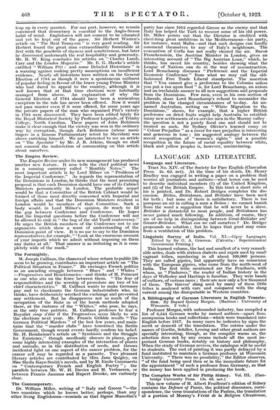The Contemporary.
Dr. William Miller, writing of " Italy and Greece "—the two countries which he knows better, perhaps, than any other living Englishman—reminds us that Signor Mussolini's party has since 1912 regarded Greece as the enemy and that Italy has helped the Turk to recover some of his old power. Dr. Miller points out that the Dictator is credited with cherishing great ambitions in the Mediterranean—his party, for instance, want Malta—and that such designs can hardly commend themselves to any of Italy's neighbours. The evacuation of Corfu has not really cleared the air. Baron Frankenstein, the Austrian Minister in London, gives an interesting account of " The Big Austrian Loan," which, he thinks, has saved his country, besides showing what the League of Nations can do in the way of reconstruction. Lord Beauchamp discusses " Preference and the Imperial Economic Conference " from what we may call the old- fashioned Free Trade Liberal standpoint. The assertion that " You cannot give a preference to the Colonies unless you put a tax upon food " is, for Lord Beauchamp, an axiom and an irrefutable answer to all new suggestions and proposals from the Dominions. Few men, even in his own section of Liberals, share Lord Beauchamp's refusal to reconsider the problem in the changed circumstances of to-day. An un- named Australian, writing on " White Migration to tht. Dominions," shows, for example, that a higher British preference on dried fruits might help Australia to establish many new settlements of ex-service men in the Murray valley • the question is not a purely fiscal one and should not be treated as such. Sir Sydney Olivier's learned essay on " Colour Prejudice " as a cover for race prejudice is interesting and generous in tone ; his suggested analogy between the recent recognition of " women's rights " and a possible recognition in the future of racial equality between white, black and yellow peoples is, however, unconvincing.










































 Previous page
Previous page